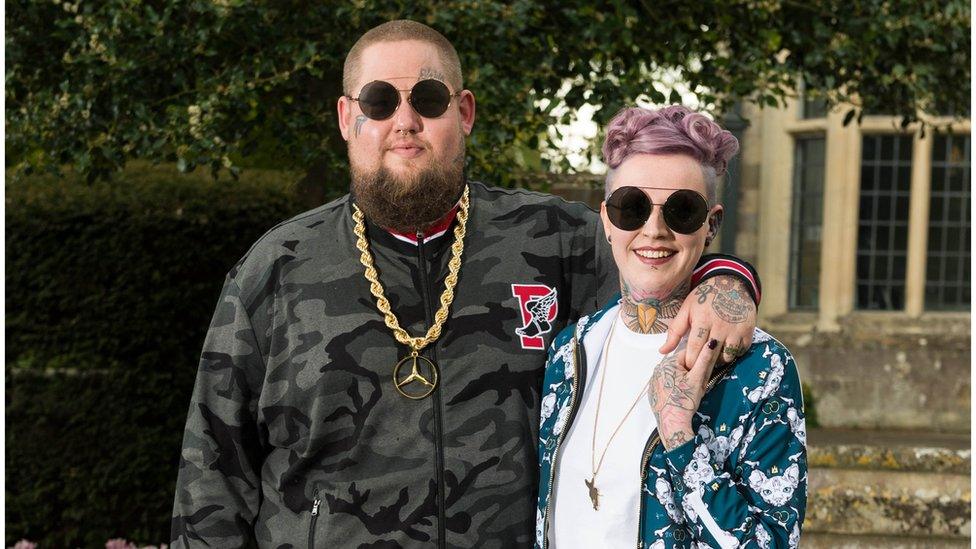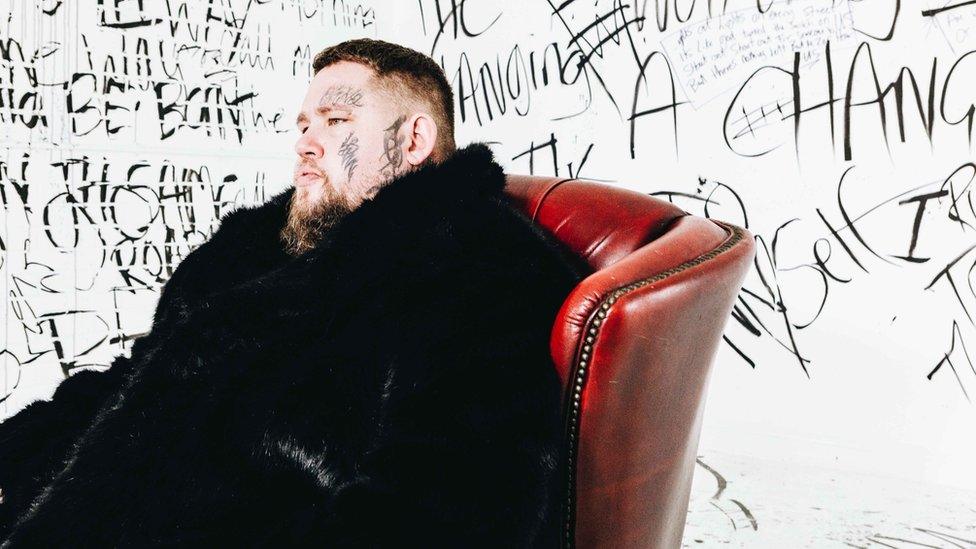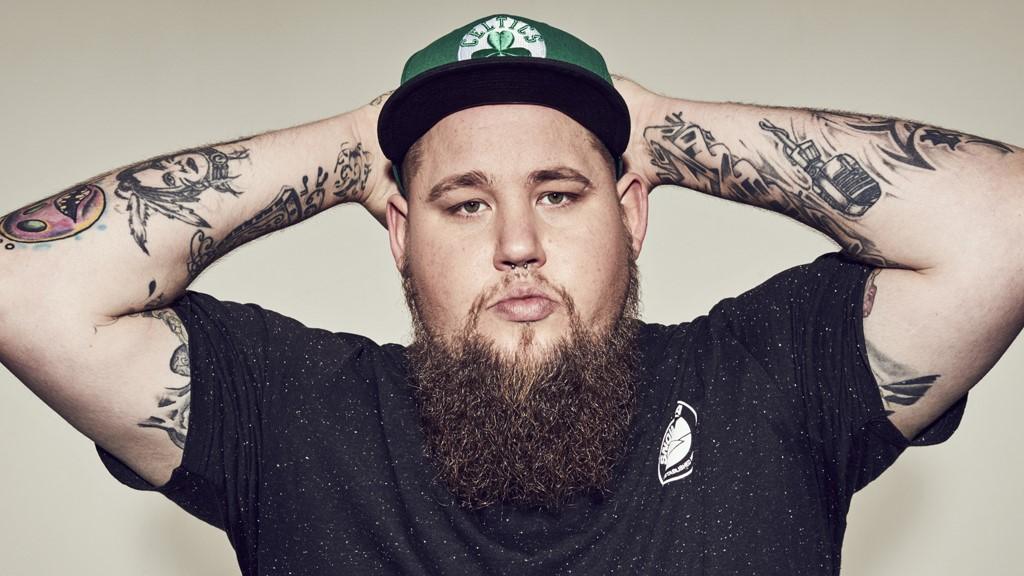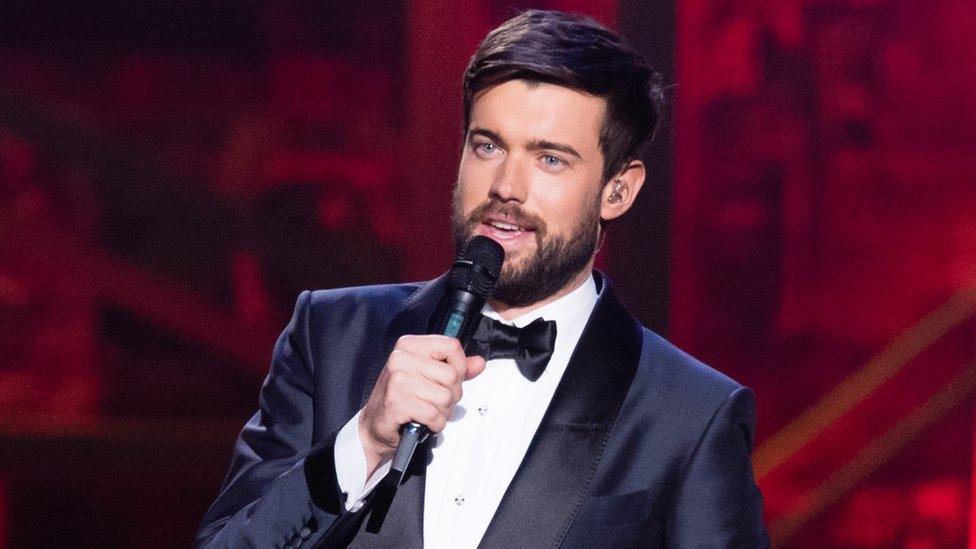Rag 'n' Bone Man on fame, tattoos and fatherhood
- Published

The star won two Brit awards in 2017 - best breakthrough and critics' choice
Uh oh. It's 10:30 in the morning, and Rag 'n' Bone Man is wearing shades indoors.
Has he succumbed to delusions of grandeur? Has he, since the global success of Human and Giant, turned into a monstrous diva? Will he storm off in a huff if his coffee isn't perfectly brewed?
No. Not at all. None of the above. He's just a little worse for wear.
"I'm hiding the hangover from last night," confesses the star, zooming the BBC from his home in Sussex where, just a few hours ago, he'd been sampling the delights of a local beer garden.
"It is nice to be back in a pub," he says wistfully, "but at the same time it's bloody freezing. It's really too cold to be out in the evening."
He might be nursing a headache, but the singer is in grand form, not least because he's finally got some live shows booked after a year indoors.
Next week, he'll perform to an audience of 4,000 at the Brit Awards, which are part of the government's pilot scheme for the return of live events. And if those test shows go well, he'll host a three-night residency at London's Jazz Café in June.
"It sort of feels mad that we actually get to play live on stage - but it's really exciting," says the star, whose real name is Rory Graham.
"The Jazz Café's only for 100 people a night, so it's definitely not a money spinner or anything. It's just about having fun and giving everyone a unique experience."
The gigs will showcase his spellbinding new album, Life By Misadventure, which is the first since his 2017 debut, Human, rocketed him to fame.
The intervening years have been something of a rollercoaster. As he accumulated platinum discs and Brit Awards, the star had a son with his long-time girlfriend Beth Rouy. The couple got married in 2019, only to split up six months later, after 10 years together.
Musically, he was struggling to follow up the success of Human. "I came off tour [in 2018] and started trying to write but nothing was working," he says. "Everything was a bit flat. It felt like a continuation of the last album."

Despite the end of his marriage, Rag 'n' Bone Man was determined not to make a break-up album, saying the topic is "overdone"
Frustrated, Graham scrapped those songs and decamped to Nashville in 2019 with his musical director Ben Jackson-Cook. There, they hooked up with songwriters like Allen Shamblin and Mike Reid, who composed the Bonnie Raitt classic I Can't Make You Love Me, and Natalie Hemby, who co-wrote Kacey Musgraves' Grammy award-winning Golden Hour.
"They have a really different way of working out there," says the star. "It was just sitting around a table, talking about what the song is about. Nobody's trying to write a hit, they're just trying to write the best songs."
The music they came up with was a big departure from the hip-hop-infused blues of Human, veering into the singer-songwriter territory occupied by Elton John, Paul Simon or Joni Mitchell in the 70s.
The drum samples and bombastic orchestration have been traded for brushed guitars and muted pianos. And while Graham's gritty, soulful baritone takes centre stage, his performances are more understated and vulnerable than before.
'No to perfection'
"There's not a lot of music at the moment, especially in the pop sense, with a sense of space," says the singer. "You can't hear any room in the vocals. It's all processed to be as clean as it can possibly be.
"I really wanted the whole thing to feel organic, so all of the songs are one-take vocals. We'd do three versions of each track and then pick the right one.
"It was about the vibe rather than trying to make every little bit perfect."
As fate would have it, perfection was off the table anyway. Graham had booked three weeks to cut the record in February last year, but as soon as he landed back in Nashville, lockdown was imposed.
"We had to quarantine for two weeks - and then only had six days to record the whole album. It was mad," he adds, but somehow it worked. "I haven't really been as proud of anything I've done as I am of this record."

The musician's first album went platinum four times
Born in Uckfield, near Brighton, Graham started his musical career rapping over drum and bass beats, before his parents encouraged him to sing at an open-mic night.
His first big break came in 2012, when his girlfriend sent promoters some of his early recordings - including videos of him singing on the toilet - earning him a support slot with Joan Armatrading.
He released his debut EP independently that year, and quickly signed a publishing deal with Warner Chappell, leading him to give up his day job as a caregiver for people with Asperger's syndrome.
As his reputation grew, he was snapped up by Columbia Records, and his gospel-inspired single Human became a huge hit in Europe, topping the German charts for 13 weeks.
Allow YouTube content?
This article contains content provided by Google YouTube. We ask for your permission before anything is loaded, as they may be using cookies and other technologies. You may want to read Google’s cookie policy, external and privacy policy, external before accepting. To view this content choose ‘accept and continue’.
It only belatedly made the UK Top 40 after it was covered on the X Factor by Emily Middlemas ("She kind of nailed it," Graham observed) but after that, his life became a whirlwind of TV shows, awards ceremonies, world tours and personal appearances.
It was not a lifestyle he adapted to easily.
"I'm quite a private person," he recently told BBC 5 Live. "I have a small group of friends and I don't like massive crowds.
"I couldn't describe something that I felt more uncomfortable with than being on a red carpet and having people shouting at you and taking pictures of you. And then having to go to an after-party where you're paraded around as the new thing.
"I remember closing my eyes at one point and wishing that one of my mates would come and rescue me. It just doesn't suit me."
Rag 'n' Bone Man tells BBC 5 Live about his struggles with fame
In many ways, lockdown was just what he needed. For the first time in six years, festival season was cancelled, and he got the chance to spend the summer with his son, Reuben.
"We live right out in the sticks, in the middle of nowhere, so we got to hunker down and spend some time together," he says.
Reuben's first words even inspired his father's newest face tattoo: the phrase, "Oh No!"
"He used to just drop food on the floor and go, 'Oh no, daddy!'" laughs the singer. "So I got that tattoo because I thought that was fun."
Reuben also inspired the opening track on Life By Misadventure, a beautiful ballad called Fireflies that's full of fatherly advice.
Other songs look at Graham's troubled childhood. He was both "a bit of a worrier" and "little terror", who had the police called on him more than once, and he tries to "teach my son that that's probably not the right thing to do".
"I want him to have the freedom to love whoever he wants and to be himself without too much teenage angst," he smiles.
'Spit and sawdust'
Despite his split from Reuben's mother, the album only contains one break-up song, Talking To Myself.
"It's such an overdone subject," he says. Instead, he's written about the "archaic" pressure on women in their 30s to start a family (Alone) and the curse of "stupid male pride" (Crossfire).
His comeback single, All You Ever Wanted, meanwhile, is a raucous, guitar-driven polemic about the decimation of the UK's live music industry.
"I'm kind of romanticising the crappy little spit and sawdust venues I went to when I grew up," he explains. "A lot of them don't exist any more and that makes me frustrated and angry.
"Like, is all you ever wanted another block of flats or a coffee shop? If those venues don't exist then where do the bands cut their teeth?"
Allow YouTube content?
This article contains content provided by Google YouTube. We ask for your permission before anything is loaded, as they may be using cookies and other technologies. You may want to read Google’s cookie policy, external and privacy policy, external before accepting. To view this content choose ‘accept and continue’.
He's also worried about the effects of Brexit on young bands, saying that new visa requirements will make touring Europe prohibitively expensive.
"I don't think it's going to affect me because I already have a fan base in those places," he says, "but it's a worry for bands coming through, where just to have a tour break even is a good result.
"I feel sorry for them, man, because that's such a great time, when you're just starting to play venues in European countries. And the fact that [the new visa rules] might stop them doing that is a real shame. I guess our government just aren't supportive of the arts."
For his own part, he's itching to get back on the road, with a full tour tentatively pencilled in for October. In particular, he can't wait to see fans' reaction to All You've Ever Wanted.
"I think it'll be a really great song to play at a festival," he grins. "Not being funny, but in the past I haven't really had many songs that people can jump around to, so I like the idea of that.
"I haven't really recorded anything that 'rocky' before, but it's moving towards the place that I want to go for the next record.
"I've always had it in me to want to be in a band. So it's one step towards that."

Follow us on Facebook, external, or on Twitter @BBCNewsEnts, external. If you have a story suggestion email entertainment.news@bbc.co.uk, external.
Related topics
- Published5 January 2017

- Published22 April 2021
